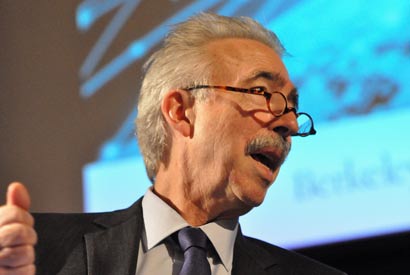Transcript extra: Handling protest
Transcript of a video conversation with incoming UC Berkeley Chancellor Nicholas Dirks, on the subject of protest.

November 27, 2012
Transcript of an excerpt of a video conversation between UC Berkeley Chancellor-designate Nicholas Dirks and Dan Mogulof of Berkeley’s Office of Public Affairs:
DAN MOGULOF: You mentioned disagreements, and that sort of leads me to another area where I think there’s some similarity between Berkeley and Columbia in that we both have students and faculty deeply engaged in the real world, passionate about things they believe in and the causes they support. That at time leads to contention, to demonstrations, to protests. I’m wondering if you’ve had any experience with that at Columbia, in managing that, what approach you’ve taken, how you’ve engaged with students and how you feel that prepares you for an equally interesting, at times chaotic, very passionate environment that you’re going to find at Berkeley.
NICHOLAS DIRKS: You know, when I first started talking to some of your colleagues about this opportunity at the University of California, Berkeley, I said that I welcomed a campus that was full of energy, that involved people in every level of public debate, both about the future of education, but also about all the other issues that circulate around our campuses. And of course, Columbia and Berkeley do share a lot of things in common. While I’ve been the executive vice president for the arts and sciences, we’ve had some incidents at Columbia that had been — I look at them now as good forms of preparation, perhaps, for what I might have to encounter when I come west. In the fall of 2006, a number of students declared that they were going to go on a hunger strike, both to protest the level of investment that had been made in ethnic studies on campus and, indeed, to promote a campus-wide conversation about the importance of thinking about African-American studies, of thinking about Latino studies, of thinking about Native American studies. And I realized that this was a serious issue, that we had to engage with all the seriousness that the students were bringing to this — and to go on a hunger strike is a commitment of seriousness, to say the least.
What I did was to basically spend every evening until the strike was resolved meeting with the negotiators as long as it needed to go, and we talked about both the history of Columbia’s commitment to ethnic studies — what we had been doing, what we were planning to do, how we could work together, how we could find ways to ensure that the concerns they had could be addressed without, however, finding new forms of of confrontation that would make other students feel somehow that the things that they were concerned about, for which they were not necessarily prepared to engage in a hunger strike, would not be compromised. And it was then the need to bring together both the strikers and their negotiators and larger student communities together to talk about the issues, to use this as an opportunity to engage in a real conversation across campus.
After 16 days and nights, we reached a successful understanding. We signed different documents. Many of them were committing to things that we had already been planning for, but they were public. They were transparent. And they were put out on a table in front of a variety of different students so that there were no special deals. And no sense on the part of anyone that we were somehow making deals with somebody because of extreme pressure here, without actually calling upon the principles and values that we would bring to all of these kinds of questions, as we decide about how we spend our resources, how we allocate resources in the arts and sciences.
For me, it was a very important opportunity to get to know some students, some of whom had actually read my work in classes but never talked to me, many of whom saw me as a suit that would come out of the administration building and thereby someone who solely represented some kind of administration point of view that was easy to caricature, but hard actually to deny when it came down and talked and shook hands and sat for hours and hours it often took to work through some of these issues.
But I hope that that kind of experience, and I hope that my commitment to dialogue, to negotiation, to talking with students and, indeed, to openness about everything that we do will perhaps be helpful in situations Berkeley where there are sometimes passions and even tempers that can grow at a pace with the needs that we have as an institution to bring communities together and resolve our differences and our disagreements in an amicable way.